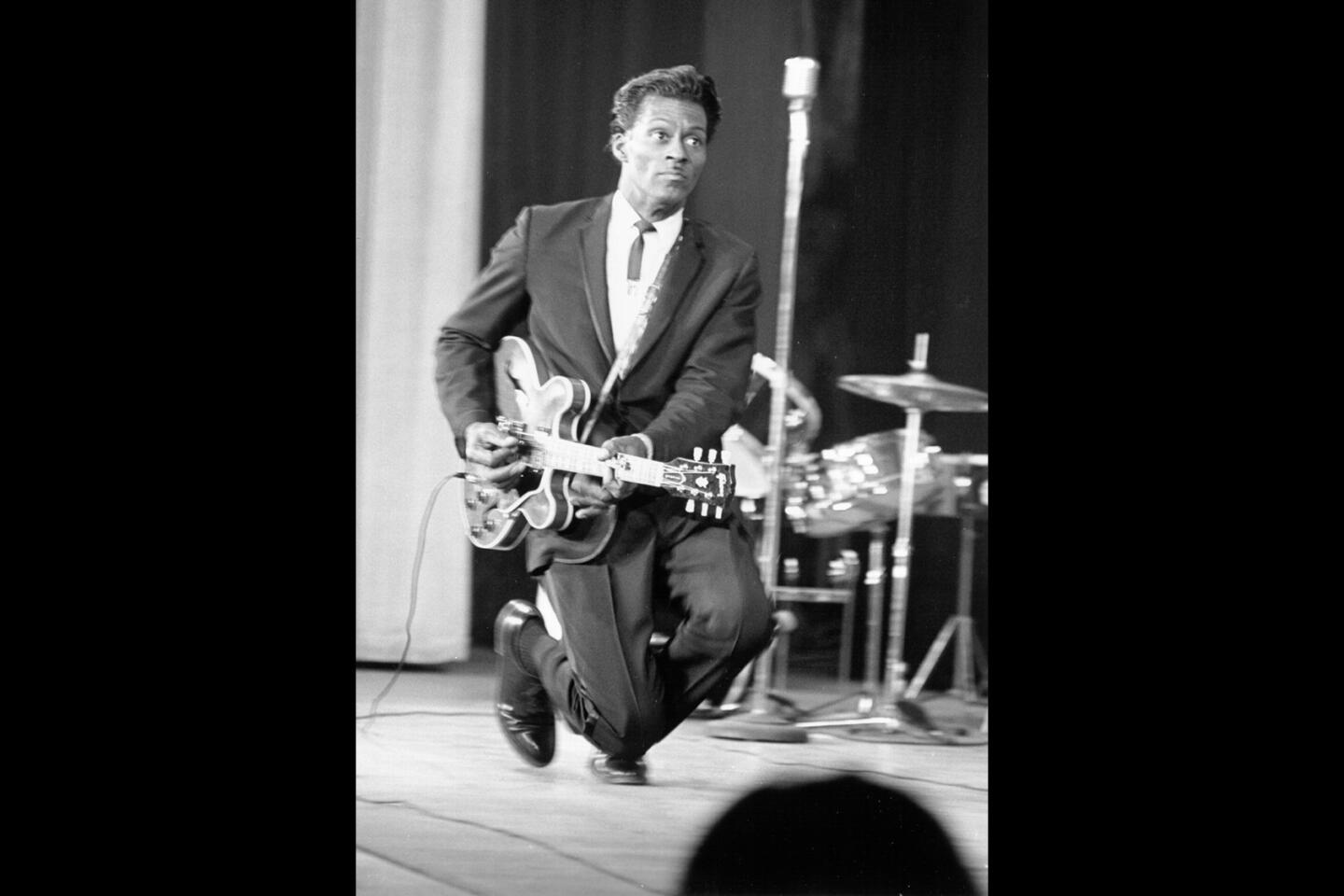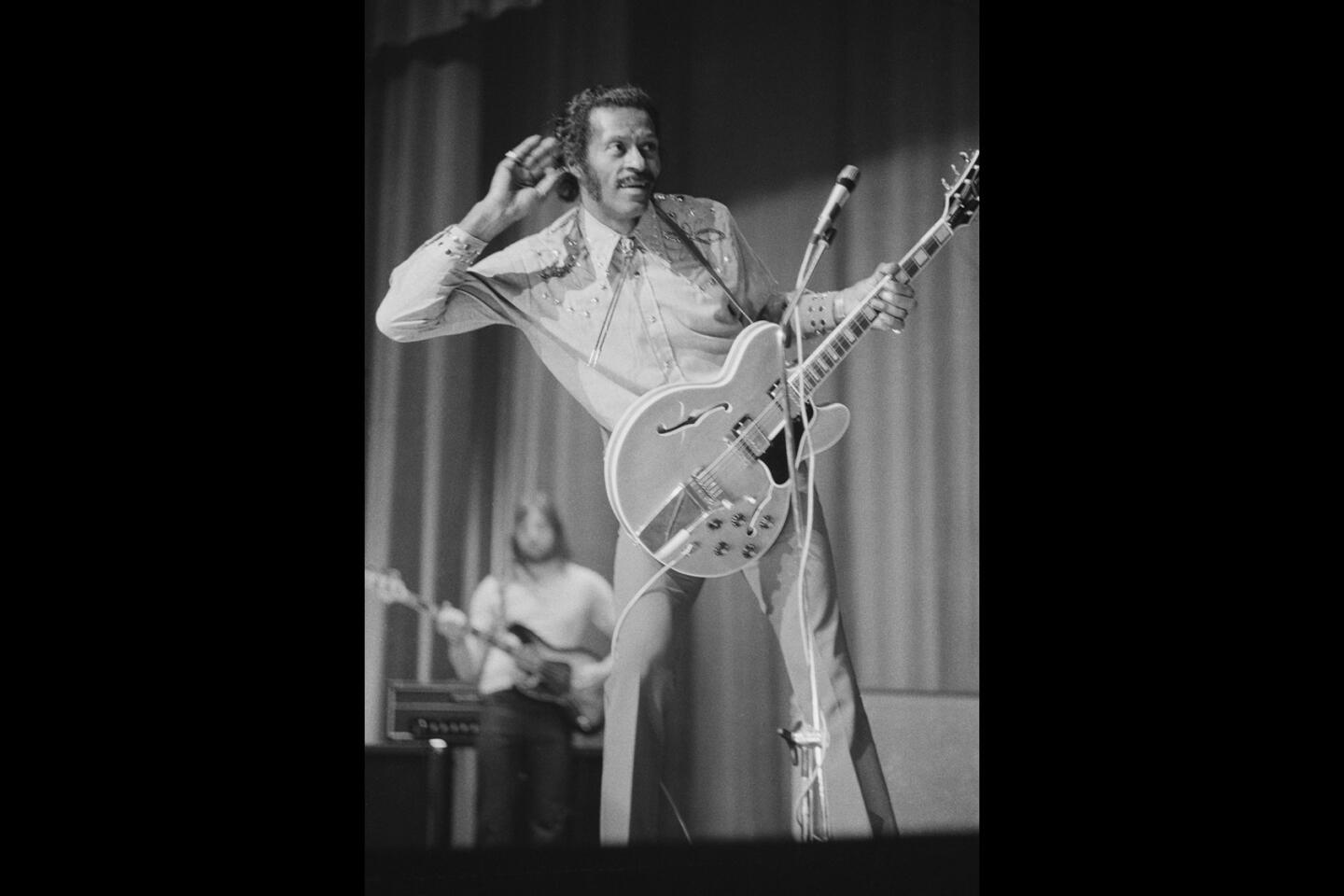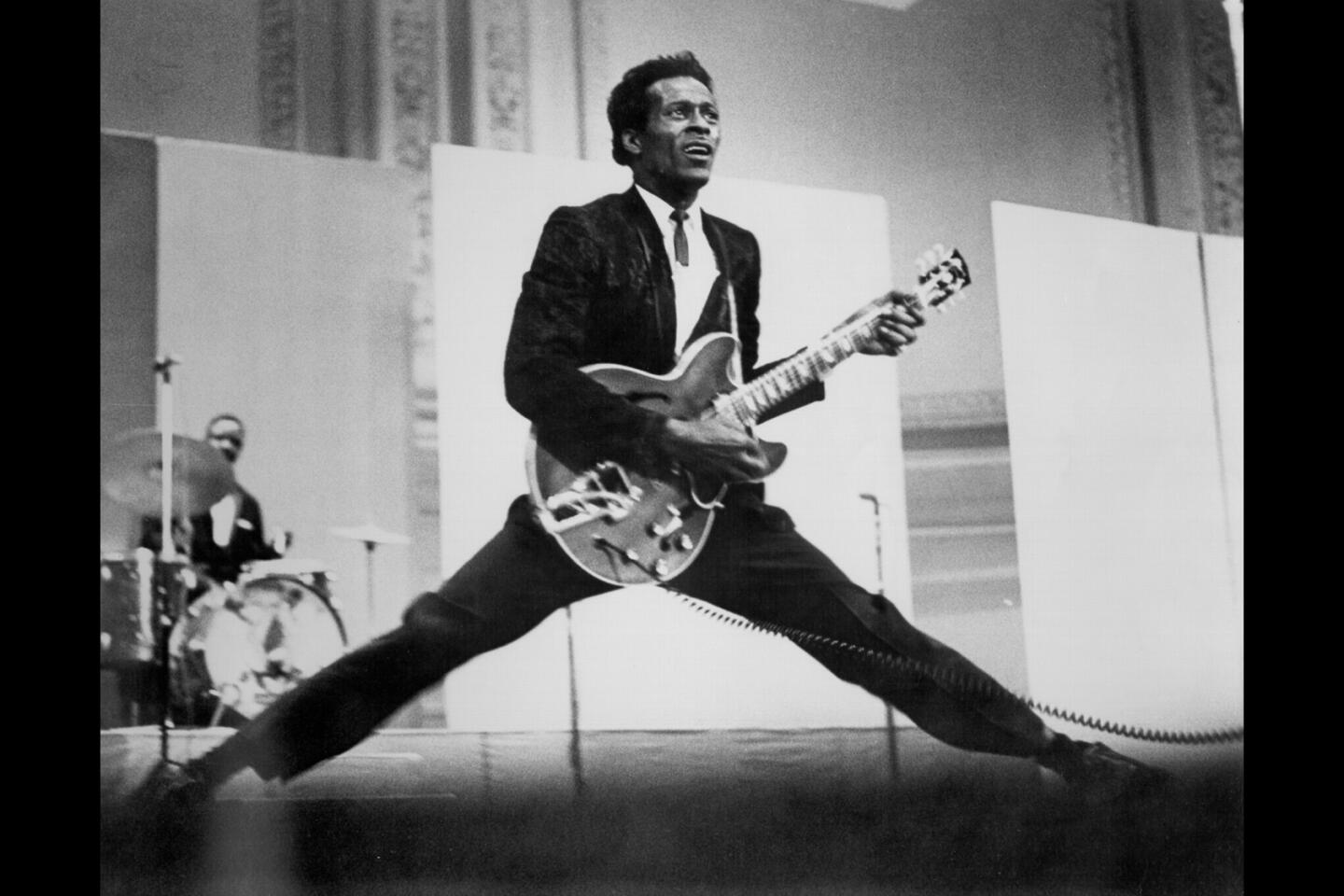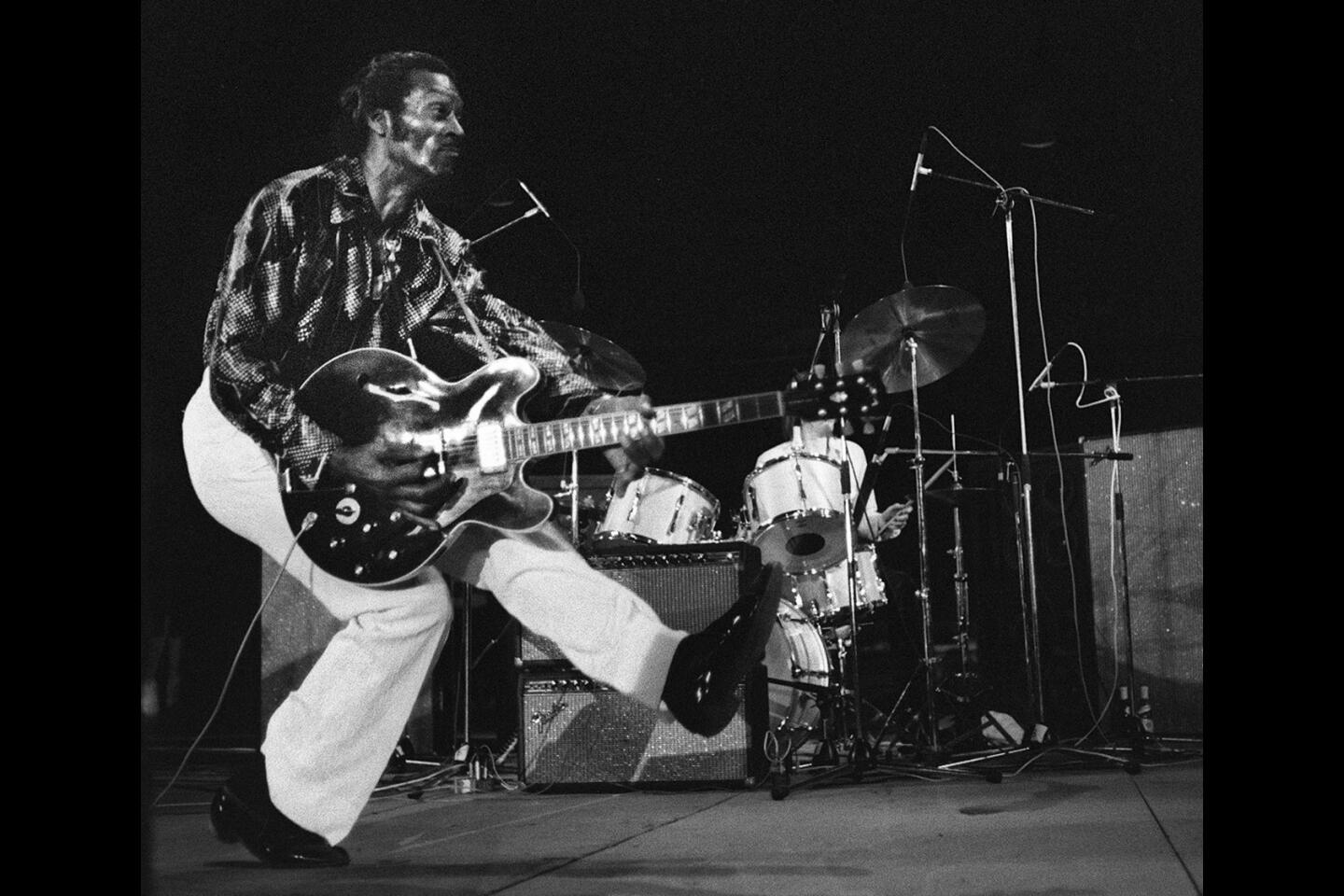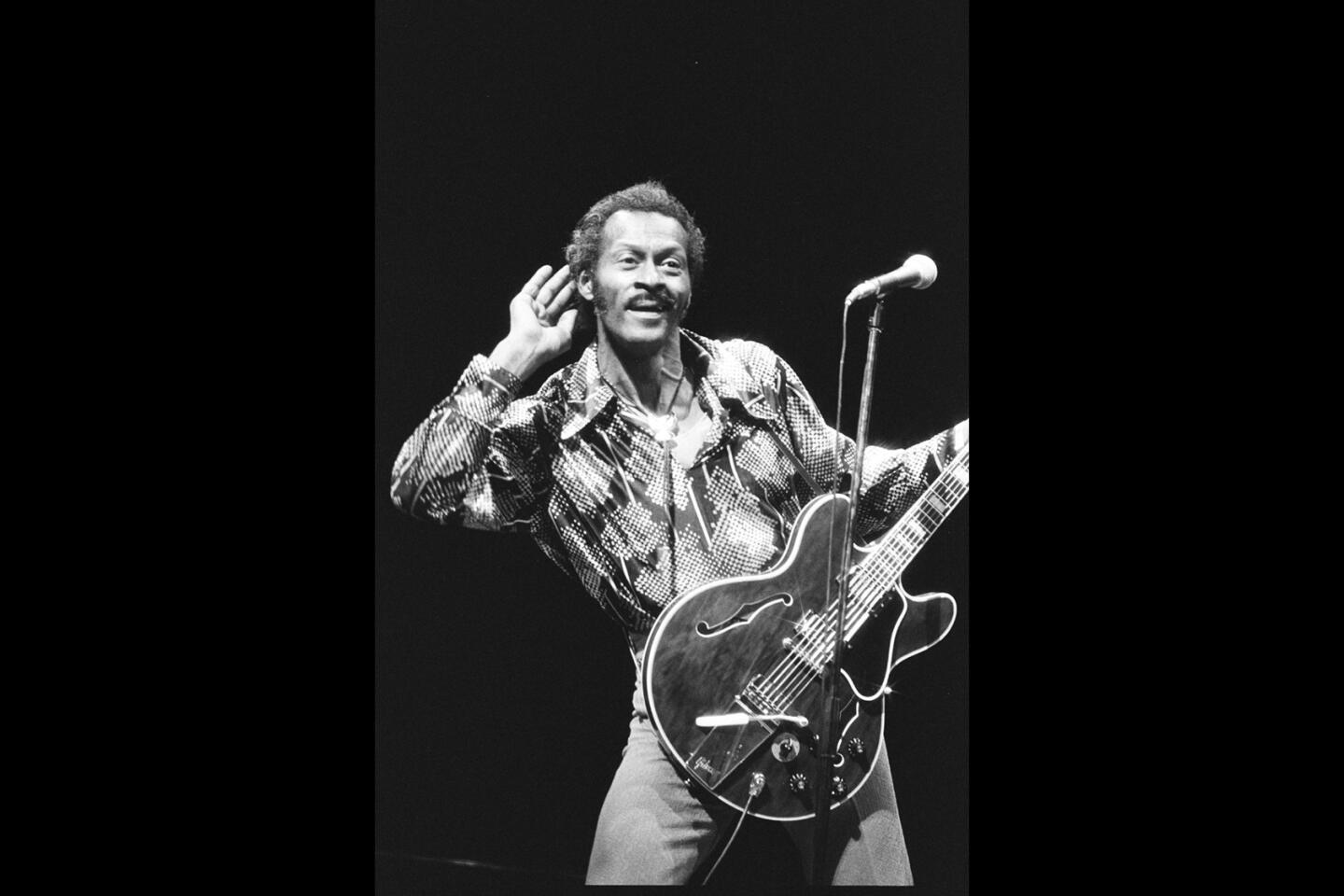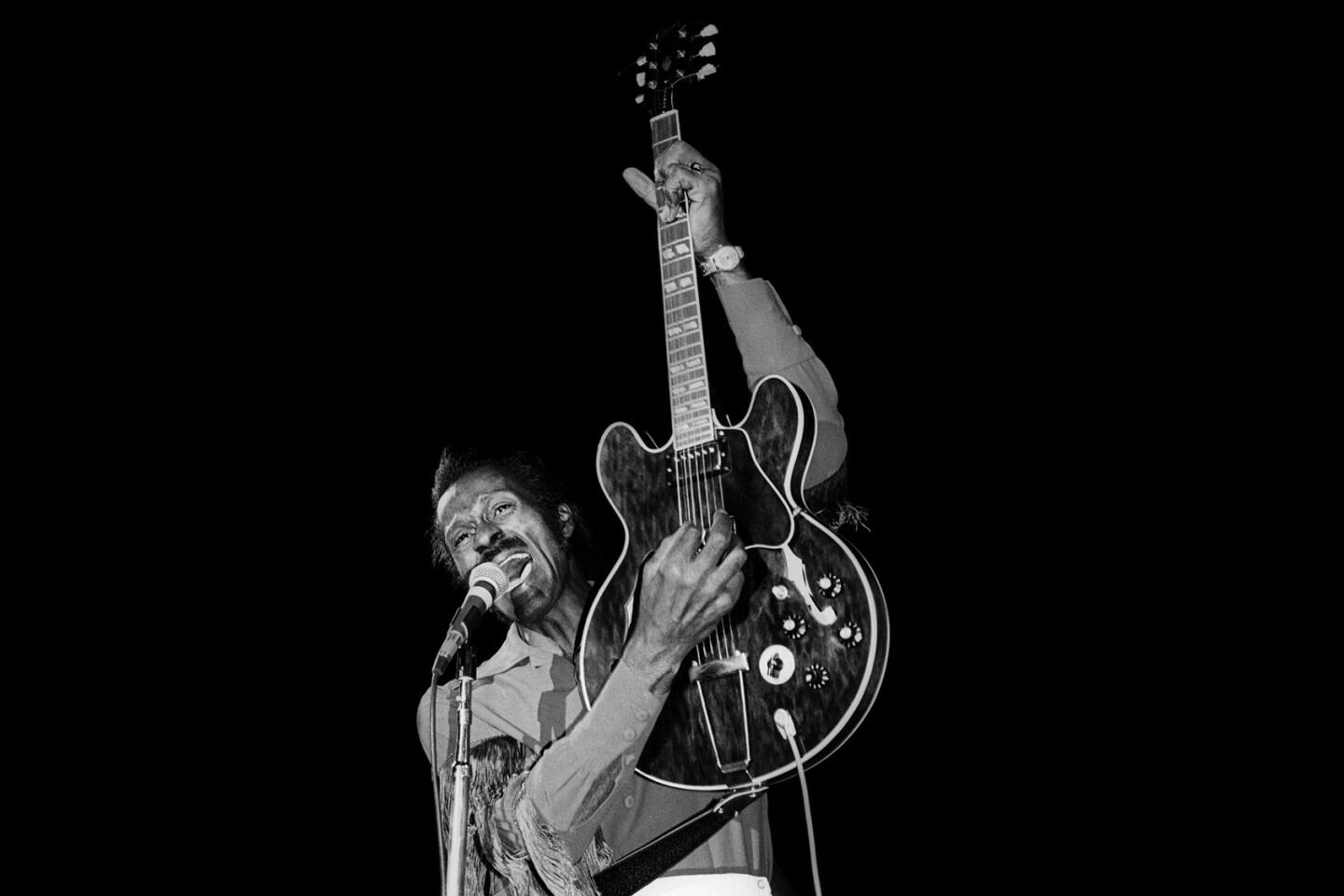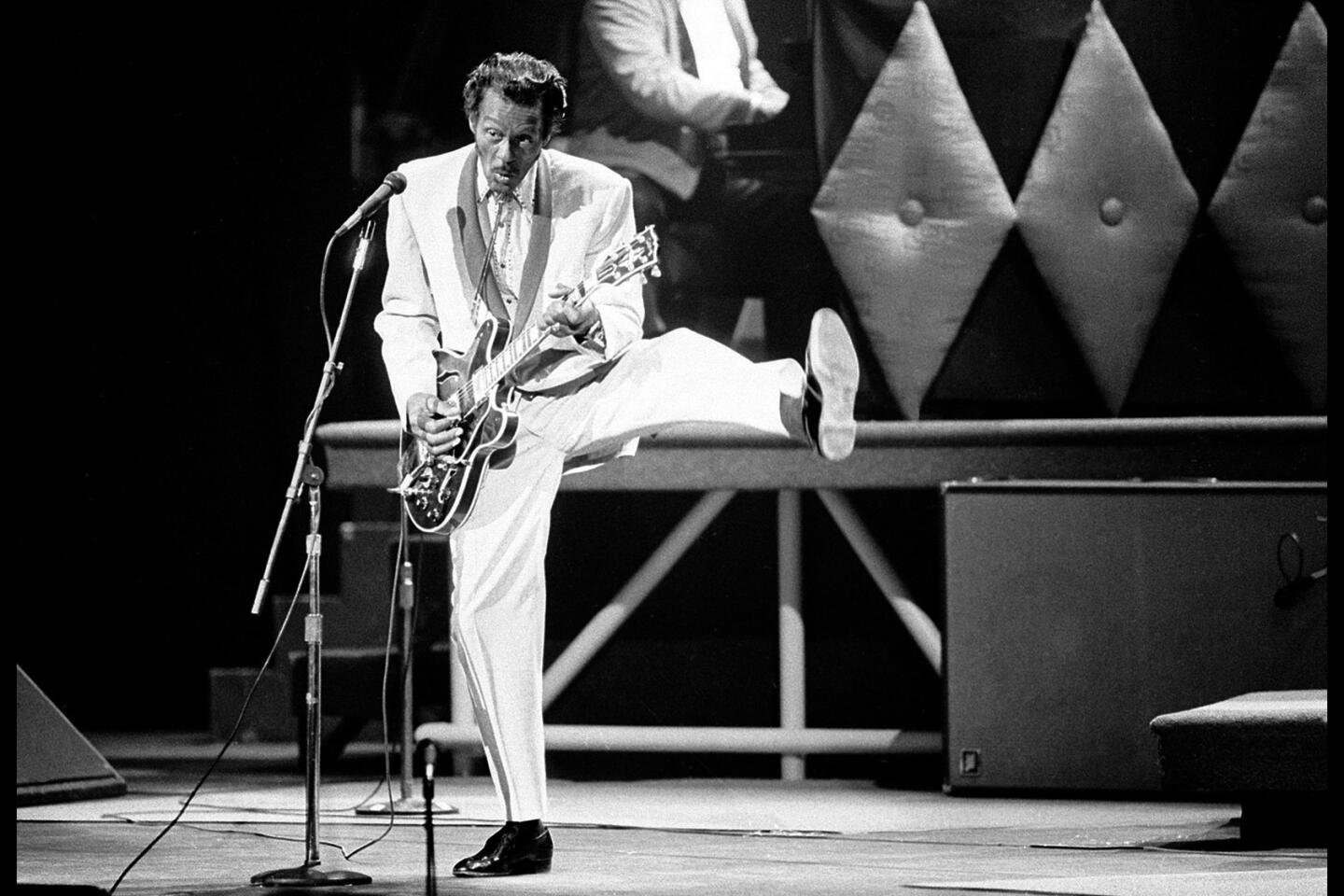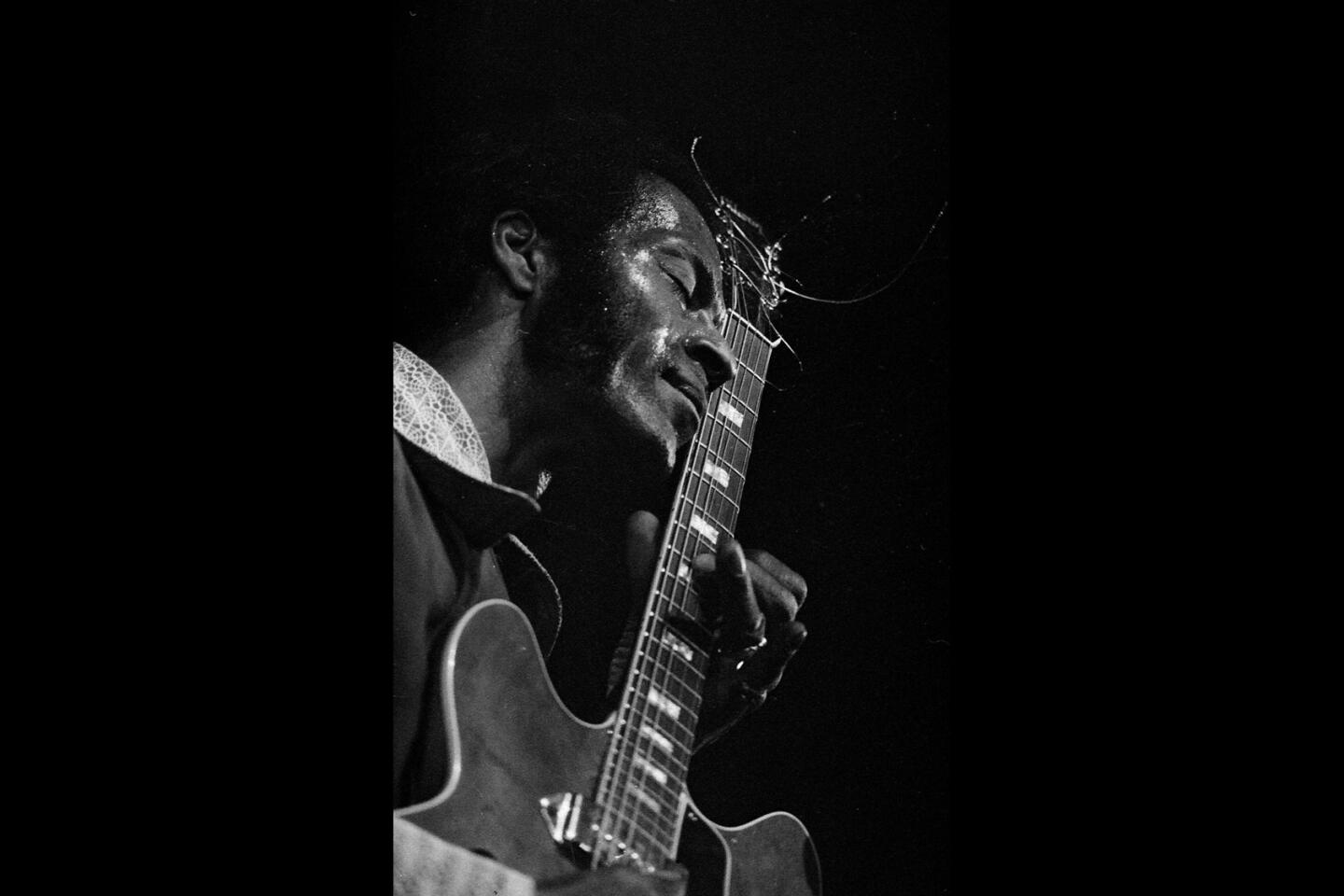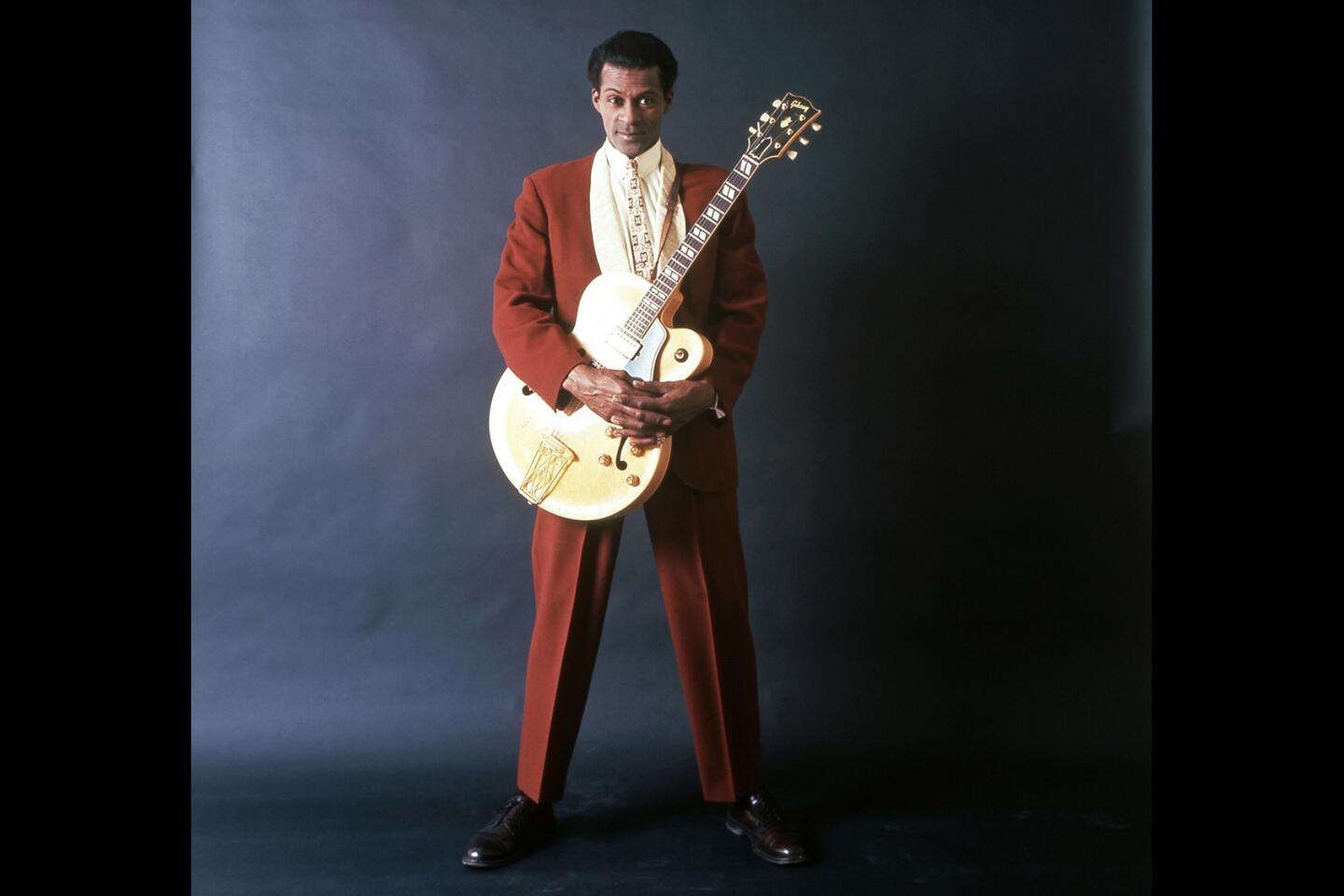Chuck Berry brought a poetâs touch â and respectability â to a brash new style of music
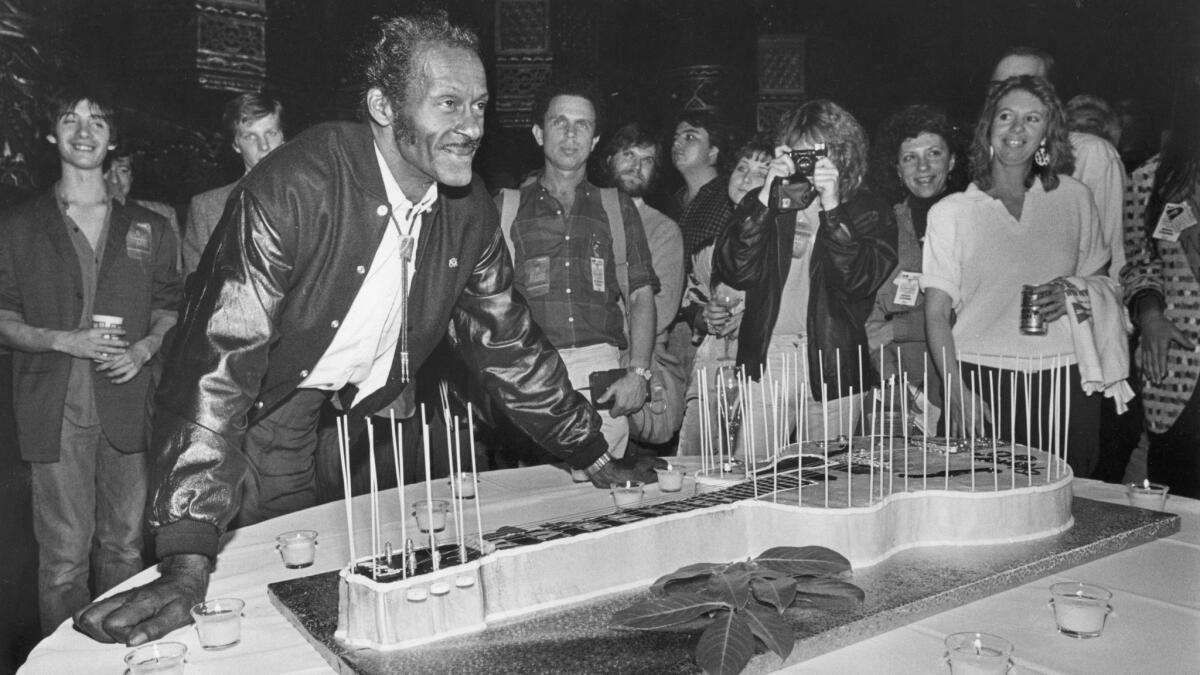
One of the original knocks against teen-oriented rock music in the 1950s, when the form was born, came from an earlier generation that had grown up with the sophisticated, erudite songs of composers and lyricists such as Cole Porter, George and Ira Gershwin and Richard Rodgers and Lorenz Hart.
Next to such songs that were almost Shakespearean in their literary maturity, âRock Around the Clock,â âHound Dogâ and other early rock hits sounded positively primitive by comparison.
âYou ainât nothinâ but a hound dogâ? Really? Members of the Greatest Generation often groused.
But then along came Chuck Berry, who wedded smart lyrical wordplay with the blistering energy of an electrified blend of blues and country music in the new genre of rock ânâ roll to establish a template thatâs still influencing pop musicians today.
See the most-read stories in Entertainment this hour Âť
âChuck Berry ⌠had been there at the beginning of everything [and] had written the bible of rock ânâ roll almost single-handed,â author Rick Bragg wrote in his 2014 biography of one of Berryâs fellow rock pioneers, Jerry Lee Lewis.
Setting aside for a moment the argument that attitude and passion were at least as important as what the lyrics said in the first iteration of rock music, Berry proved quickly that it wasnât an either/or situation.
âI saw her from the corner when she turned and doubled back / And started walkinâ toward a coffee-colored Cadillac,â Berry wrote in âNadine,â crafting not only a compelling narrative of romantic attraction but also one that completed a rhyme with a brilliant example of alliteration.
Just as teenagers across the country were rebelling against beliefs and customs held dear by their parents and grandparents, Berry demonstrated time and again that he wasnât going to be reined in by conventions of language and usage.
He not only famously invented his own words â âmotorvatinâ over the hillâ when he âsaw Maybellene in a Coupe de Villeâ â but he also had a great ear for poetic words in the world around him.
In his sweet ode to a young married couple starting their life together, âYou Never Can Tell,â he describes their modest home with the sense of detail of an accomplished novelist, including his reference to a particularly evocative brand of refrigerator: âThey furnished off an apartment with a two-room Roebuck sale / The Coolerator was crammed with TV dinners and ginger ale.â
Chuck Berry [wrote] the bible of rock ânâ roll almost single-handed.
— Author Rick Bragg
Berry consistently avoided cliches and stock images or situations. He was investing layers of emotion and meaning into songs long before Bob Dylan came along and started people talking about rock ânâ roll as an art form.
âMemphisâ is a great example, establishing what sounds like a coupleâs classic breakup story, only to cap it with a twist worthy of O. Henry.
âLong distance information, give me Memphis, Tennessee / Help me find the party trying to get in touch with me / She could not leave her number, but I know who placed the call / âCuz my uncle took a message and he wrote it on the wall.â
Berry adds to the drama, building on our preconceived expectations of the caller, in a subsequent verse, singing: âWe were pulled apart because her mom did not agree / and tore apart our happy home in Memphis, Tennessee.â
Only in the final verse, in the penultimate line, do we get the real story: âMarie is only 6 years old, information please / Try to put me through to her in Memphis, Tennessee.â
Berry loved the sound of words, and the power in being able to string together the right combination to pull listeners into his world.
He was relatively old when rock ânâ roll exploded in the mid-1950s, born nearly a decade before other first-generation rockers such as Lewis, Elvis Presley and Buddy Holly.
It was that age gap that helped give Berry the perspective of a sharp observer, rather than participant. That often came into play in his songwriting, which both described and helped codify the emerging youth culture that was born in the aftermath of World War II.
He was often a reporter â a witty and poetic one â on what was happening in the culture at that moment as rock ânâ roll took over.
That came out in many of his best-known songs, including âJohnny B. Goode,â about a âcountry boyâ ⌠âwho never ever learned to read or write so wellâ but âcould play the guitar just like ringing a bell,â plus âRock & Roll Music,â âLittle Queenieâ and âSchool Day.â
âThere she is again / standing over by the record machine,â he wrote in âLittle Queenie.â âLooking like a model on the cover of a magazine, / sheâs too cute to be a minute over seventeen.â
Another writer might have left the age reference at 17, or perhaps âa day over seventeen.â But Berry gave it another measure of specificity by choosing to write âa minute over seventeen.â
He also gave his young audience songs they could instantly identify with. âSweet Little Sixteenâ painted a full-fledged portrait of the earnest teenage rock ânâ roll fan:
âSweet Little Sixteen, / sheâs just got to have / about a half a million / framed autographs.â And he smartly name-checked half a dozen places of the country, giving hundreds of thousands of kids the feeling he was speaking directly to them:
âTheyâre really rockinâ in Boston / In Pittsburgh, PA / Deep in the heart of Texas / and round the Frisco Bay / All over St. Louis / and down in New Orleans / all the cats wanna dance with / Sweet Little Sixteen.â
A wry sense of humor was evident in many of his songs, like the scene he painted in âNo Particular Place to Goâ of a young couple out on a romantic late-night drive, when âthe moon was boldâ and they decided âto take a strollâ â except for one problem: âCan you imagine the way I felt? I couldnât unfasten her safety belt!â
Another of Berryâs genius strokes was the way he almost subliminally incorporated glimpses into the African American experience before it became a common theme in pop music in the 1960s and â70s.
As Mick Jagger noted after hearing of Berryâs death, âHis lyrics shone above others and threw a strange light on the American dreamâ for the legion of young British musicians who were soaking up American blues and R&B music en route to launching the British Invasion.
Nine years after Jackie Robinson broke the color barrier in major league baseball by joining the Brooklyn Dodgers as the leagueâs first African American player, Berry wrote this verse in his 1956 hit âBrown-Eyed Handsome Manâ:
âTwo, three count with nobody on / He hit a high fly into the stand / Rounding third he was headed for home / It was a brown-eyed handsome man that won the game / it was a brown-eyed handsome man.â
So large did Berryâs shadow as a songwriter loom that many of the titans of the musical generation that followed saluted him in one way or another, sometimes so closely that it came back to bite them.
Dylan has always acknowledged that the dizzying flurry of rhymes and images he spun out in âSubterranean Homesick Bluesâ â âJohnnyâs in the basement, mixing up the medicine, Iâm on the pavement, thinking âbout the governmentâ â owed much to Berryâs âToo Much Monkey Businessâ: âPay phone, somethinâ wrong, dime gone, will mail / I ought to sue the operator for tellinâ me a tale.â
Beach Boys creative leader Brian Wilson likewise said he was simply paying homage to Berry with his rewrite of âSweet Little Sixteenâ as âSurfinâ U.S.A.â Wilson learned about the fine line between homage and infringement when Berry sued, and won, resulting in him subsequently being credited as a co-writer of the Beach Boysâ hit from that point forward.
John Lennon also discovered the perils of crossing Berryâs watchful eye when the Beatles recorded âCome Together,â which closely paralleled and even lifted the opening line virtually verbatim from Berryâs âYou Canât Catch Me.â (âHere come a [old] flat-topâ).
âCome Togetherâ remains credited to John Lennon and Paul McCartney, but to settle a suit brought by Morris Levy, publisher of âYou Canât Catch Me,â Lennon was required to record three Berry songs, and thus generate more publishing royalty payments to Levy.
Berryâs far-reaching impact has been acknowledged by virtually all his peers (of which there were few), and his countless disciples, from Presley, Lewis, Holly and Little Richard on down through the Beatles, the Rolling Stones, Bruce Springsteen, Tom Petty & the Heartbreakers and too many others to catalog.
âR.I.P. and peace and love Chuck Berry, Mr. Rock ânâ roll music,â Beatles drummer Ringo Starr tweeted shortly after news of Berryâs death broke Saturday.
As to the generational complaint about the radical new sound of rock ânâ roll, the genreâs first great poet provided the happy ending celebrating inclusivity in âYou Never Can Tellâ that found the newlywed couple soaking up a variety of sounds in their new lives together:
âThey had a hi-fi phono, boy / did they let it blast / Seven hundred little records, / all rock, rhythm and jazz / But when the sun went down / the rapid tempo of the music fell / âCâest la vie,â say the old folks, / it goes to show you never can tell.â
Follow @RandyLewis2 on Twitter.com
For Classic Rock coverage, join us on Facebook
ALSO:
10 Chuck Berry songs that inspired the rest of rock ânâ roll
Chuck Berry talks music, race and his âdifficultâ reputation
The time Chuck Berry and Keith Richards clashed onstage: âYouâre going to have to let me leadâ
More to Read
The biggest entertainment stories
Get our big stories about Hollywood, film, television, music, arts, culture and more right in your inbox as soon as they publish.
You may occasionally receive promotional content from the Los Angeles Times.
